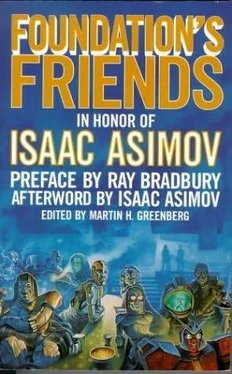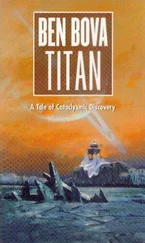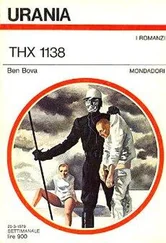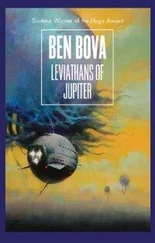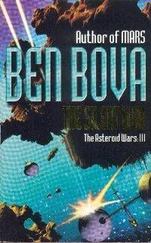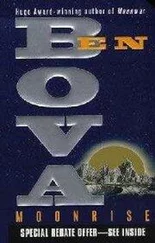Ben Bova - Foundation’s Friends
Здесь есть возможность читать онлайн «Ben Bova - Foundation’s Friends» весь текст электронной книги совершенно бесплатно (целиком полную версию без сокращений). В некоторых случаях можно слушать аудио, скачать через торрент в формате fb2 и присутствует краткое содержание. Год выпуска: 1989, ISBN: 1989, Издательство: Tor Books, Жанр: Фантастика и фэнтези, на английском языке. Описание произведения, (предисловие) а так же отзывы посетителей доступны на портале библиотеки ЛибКат.
- Название:Foundation’s Friends
- Автор:
- Издательство:Tor Books
- Жанр:
- Год:1989
- ISBN:ISBN: 0-312-93174-3
- Рейтинг книги:3 / 5. Голосов: 1
-
Избранное:Добавить в избранное
- Отзывы:
-
Ваша оценка:
- 60
- 1
- 2
- 3
- 4
- 5
Foundation’s Friends: краткое содержание, описание и аннотация
Предлагаем к чтению аннотацию, описание, краткое содержание или предисловие (зависит от того, что написал сам автор книги «Foundation’s Friends»). Если вы не нашли необходимую информацию о книге — напишите в комментариях, мы постараемся отыскать её.
Foundation’s Friends — читать онлайн бесплатно полную книгу (весь текст) целиком
Ниже представлен текст книги, разбитый по страницам. Система сохранения места последней прочитанной страницы, позволяет с удобством читать онлайн бесплатно книгу «Foundation’s Friends», без необходимости каждый раз заново искать на чём Вы остановились. Поставьте закладку, и сможете в любой момент перейти на страницу, на которой закончили чтение.
Интервал:
Закладка:
“Not a theory, just a proposal, just a thought-”
“-and a few psychohistorians will see whether it can be quantified, perhaps by some variation on the formulas we’ve been using with Deet’s laws of community development. Maybe we can turn origin studies into a real science yet.”
“Maybe,” Leyel said.
“Feel all right about this?” asked Zay.
“I’m not sure. Mostly. I’m very excited, but I’m also a little angry at how I’ve been left out, but mostly I’m-I’m so relieved.”
“Good. You’re in a hopeless muddle. You’ll do your best work if we can keep you off balance forever.” With that, Zay led him back to the bed, helped him lie down, and then left the room.
Alone with Deet, Leyel had nothing to say. He just held her hand and looked up into her face, his heart too full to say anything with words. All the news about Hari’s byzantine plans and a Second Foundation full of psychohistorians and Rom Divart taking over the government-that receded into the background. What mattered was this: Deet’s hand in his, her eyes looking into his, and her heart, her self, her soul so closely bound to his that he couldn’t tell and didn’t care where he left off and she began.
How could he ever have imagined that she was leaving him? They had created each other through all these years of marriage. Deet was the most splendid accomplishment of his life, and he was the most valued creation of hers. We are each other’s parent, each other’s child. We might accomplish great works that will live on in this other community, the library, the Second Foundation. But the greatest work of all is the one that will die with us, the one that no one else will ever know of, because they remain perpetually outside. We can’t even explain it to them. They don’t have the language to understand us. We cat) only speak it to each other.
A Word or Two from Janet
by Janet Jeppson Asimov
I am often asked what it’s like to be Isaac Asimov’s wife or, as he referred to me in a recent speech, “the present holder of that enviable position.” I usually mull over several possible answers:
1. Isaac is, conveniently, a walking dictionary and encyclopedia, able to impart information quickly, accurately, and eloquently because he has well-honed powers of expression and an incredible memory-which gets him into trouble, since there are too many things he can’t forget. For instance, he is likely to say sadly, “This is the one hundred eighty-third anniversary of the Battle of Austerlitz and nobody cares!” Each December 2, since I have forgotten what he told me the year before, I have to ask him to explain allover again. Fortunately, although he does not put up with fools gladly, he puts up with me, and explains.
2. Isaac is reassuringly rational, with exceptions. He believes in the spectacular law-that if he flips up the dark spectacles attached to his eyeglasses, the sun will come out, and vice versa. Furthermore, in the baseball season he thinks the Mets will lose any game he dares to watch. Once they start losing, he turns off the TV and shouts, “I have to stop watching and go back to my typewriter to give them a chance!”
3. He has a wonderful lack of fear about showing emotion. Not only is he affectionate and demonstrative, he doesn’t even know what a stiff upper lip is. Isaac’s lower lip quivers most when he has to have a blood sample drawn, but even then he manages to flirt with the female doing it. He’s not afraid to cry (he always does when he reads Enobarbus’s last speech or sings ‘Danny Boy’), and will do so even in public, the way he did at Newton’s grave.
4. Isaac has a point of view that makes me glad I know him. For instance, he woke up once with his legs making running motions in the bed. He said, “I dreamt someone told me I was making a good living out of writing, and I said yes indeed I was. Then the person said, ‘It’s amazing to see someone make all that money out of beaten swords.’ I was running to tell you because it instantly struck me that the phrase meant I made my money out of the instruments of peace-the pen is mightier than the sword and thou shalt beat thy swords into plowshares.”
As you can see, there are many answers to the question of what it’s like to be Isaac Asimov’s wife, but the best is that my spouse defies description. Oddly enough, people always seem to be describing Isaac, and he is still on speaking terms with most of them. Perhaps paleontologist Simpson’s description is definitive-”Isaac Asimov is a natural wonder and a national resource.” I can testify that he is a wonder, completely natural, infinitely resourceful, and a dear.
We have a little wooden sculpture of two old people placidly sitting side by side, leaning toward each other. To me, they represent the contentment of being part of the pattern of life, together. The pattern includes intimacy and creativity, which have a lot in common because both take commitment, concentration, openness, effort, and inspiration.
My personal fiftieth anniversary with Isaac Asimov occurs in the third decade of the next century. Since life contains the three essential elements of a good work of fiction-a beginning, a middle, and an end-it is possible that Isaac and I won’t be here for that anniversary, but his books will. And the stories people write because of him. Like those in this book, done with love.
Fifty Years
by Isaac Asimov
I’ve got to start by expressing thanks. I want to thank Martin H. Greenberg for having the idea of memorializing my fifty years in science fiction in this fashion. I want to thank Tor Books for publishing the book. I want to thank all my fellow writers who have contributed stories to this book, and who have, in this way, demonstrated the fact that they feel friendly toward me and kindly toward my works. And I want to thank Janet for contributing, too, in all the ways she does and has.
This is all more than I deserve, for it means I have made my way through life making so many friends and so remarkably few enemies that I must have done something right by accident, and I’m grateful for that more than anything else.
But it’s fifty years! That’s why all this is happening! Fifty years! Half a century!
So let’s see what thoughts this gives rise to
1. Fifty years. It’s a reasonably long time. Merely to live for fifty years is not terribly unusual these days, but many great people have not managed. Joan of Arc died at nineteen. Of the great poets: John Keats died at twenty-six; Percy Bysshe Shelley died at thirty; George Gordon Noel Byron died at thirty-six; Edgar Allan Poe died at forty. Of the great scientists, Sadi Carnot died at thirty-six; Heinrich Rudolf Hertz died at thirty-six; James C. Maxwell died at forty-eight.
When you pass the half-century mark, with all this in mind, you can’t help but feel a bit hangdog about it. The Greeks visualized the three Fates: Clotho (“spinner”), who formed the thread of life; Lachesis (“determiner by lot”), who measured its length; and Atropos (“unswervable”), who cut it, in the end. I thank them all as well. I thank Clotho for spinning such a good life; Lachesis for spinning one that is longer than those of many others far more deserving than myself; and to Atropos for withholding her formidable shears for as long as she has.
2. Fifty years of professional work. But it’s not just fifty years. It’s fifty years in a single profession, that of writing. My first story appeared in 1939 and there has been a regular procession of stories, essays, and books of all sorts ever since.
When Charles Dickens died at fifty-eight, he had been publishing for only thirty-five years. When Alexandre Dumas died at fifty-eight, he had been publishing for only forty-one years. William Shakespeare, who died at fifty-two, turned out all his professional works over a period of only thirty years.
Читать дальшеИнтервал:
Закладка:
Похожие книги на «Foundation’s Friends»
Представляем Вашему вниманию похожие книги на «Foundation’s Friends» списком для выбора. Мы отобрали схожую по названию и смыслу литературу в надежде предоставить читателям больше вариантов отыскать новые, интересные, ещё непрочитанные произведения.
Обсуждение, отзывы о книге «Foundation’s Friends» и просто собственные мнения читателей. Оставьте ваши комментарии, напишите, что Вы думаете о произведении, его смысле или главных героях. Укажите что конкретно понравилось, а что нет, и почему Вы так считаете.
